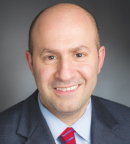A novel approach using a drug called MK-6482 showed activity in a phase I/II study in patients with metastatic clear cell renal cell carcinoma, according to a presentation at the 2020 Genitourinary Cancers Symposium.1 MK-6482 is an oral, first-in-class selective small-molecule inhibitor that targets hypoxia-inducible factor (HIF)-2a, which promotes the growth of new vessels that fuel kidney cancer. In heavily pretreated patients with metastatic disease, the objective response rate to single-agent MK-6842 was 24%, and responses were consistently seen across patients with favorable-, intermediate-, and poor-risk disease.

Toni Choueiri, MD
“A new drug as a single agent showing an overall response rate of 24% across all risk categories and in a heavily refractory population is quite promising,” said lead author Toni Choueiri, MD, Director of the Lank Center for Genitourinary Oncology at Dana-Farber Cancer Institute and the Jerome and Nancy Kohlberg Professor of Medicine at Harvard Medical School, Boston.
HIF-2a enables the body to adjust to hypoxia by “turning on” the genes that can make more red blood cells and form new blood vessels. The Nobel Prize in Medicine was awarded to William G. Kaelin, MD, Dr. Choueiri’s mentor, along with two other researchers for unravelling this complex mechanism, which can be hijacked by cancer to cause cell proliferation.
“This is one of the most promising drugs we have in development for kidney cancer,” said ASCO Expert Sumanta Pal, MD, of the City of Hope, Duarte, California. “The mechanism of action is compelling, and the response rates are very impressive in this population of patients with extensive prior therapy ”
Background
The Von Hippel-Lindau (VHL) tumor-suppressor protein is not functional in about 90% of patients with clear cell renal cell carcinoma, leading to accumulation of HIF proteins inside the tumor cell. This process wrongly signals that there is a shortage of blood vessels and activates the formation of blood vessels, driving tumor growth.
Understanding of this abnormal process related to clear cell renal cell carcinoma paved the way for new cancer drugs, such as MK-6482. Distinct from other such drugs, MK-6482 directly targets HIF-2a, blocking cancer cell growth, proliferation, and abnormal blood vessel formation.

“MK-6482 is probably the most promising drug we have in kidney cancer.”— Sumanta Pal, MD
Tweet this quote
Study Details
In a dose-finding phase I study, the dose of MK-6482 identified for further study was 120 mg/d. Dr. Choueiri reported results in the dose-expansion cohort comprising 55 patients with previously treated advanced clear cell renal cell carcinoma who received MK-6482 at 120 mg/d and were treated until progressive disease or unacceptable toxicity. Of these patients, 39 (71%) discontinued treatment, most commonly for disease progression (55%). At the time these data were presented, 16 patients (25%) were on ongoing treatment. The median follow-up was 13 months.
At baseline, the median age was 62 years, 80% were male, the median number of prior systemic therapies was three (range, 1–9), and 62% of patients had received three or more prior therapies. A total of 67% of patients received both prior anti–PD-1 (programmed cell death protein 1) and anti-VEGF (vascular endothelial growth factor) agents.
Toxicity and Outcomes
Adverse events of note were anemia (75% all grades; 6% grade 3, and 49% grades 1 and 2) and hypoxia (26% all grades; 15% grade 3; and 11% grades 1 and 2). “Anemia and hypoxia are on-target effects of this drug,” Dr. Choueiri told listeners.
Two patients experienced a total of four grade 4 adverse events (hypercalcemia, sepsis, cardiac arrest, and respiratory failure). Four patients experienced grade 5 adverse events, all secondary to progressive disease. Two patients discontinued treatment after hypoxia. Five patients (10%) required dose reductions to manage drug-related adverse events. No deaths were reported due to a treatment-related adverse event.
KEY POINTS
- An early study of patients with metastatic clear cell renal cell cancer shows encouraging response rates with a novel agent targeting hypoxia.
- MK-6482 is unique in that it is a first-in-class oral drug that selectively targets hypoxia-inducible factor (HIF)-2a, enabling the body to adjust to hypoxia and grow more red blood cells and new vessels.
- Further study of this drug is planned in a phase III trial.
The best confirmed objective response rate was 24%, and responses were seen across all risk categories. The disease control rate was 80% in all patients, and high disease control rates were seen across all risk categories as follows: 100% in favorable-risk patients, 80% in intermediate-risk patients, and 70% in poor-risk patients. The median duration of response was not reached. A total of 81% of patients experienced a response that lasted for 6 months or longer, as of the cutoff date of May 15, 2019.
At a median follow-up of 13 months, the median progression-free survival was 11 months among all patients, 16.5 months among favorable-risk patients, 11 months among intermediate-risk patients, and 6.9 months among poor-risk patients. “MK-6482 helped all risk groups,” Dr. Choueiri emphasized.
“MK-6482 is well tolerated and has a favorable safety profile. After 13 months, promising clinical activity was observed in heavily pretreated advanced clear cell renal cell carcinoma, with clinical activity across all risk groups,” he said.
A phase III trial of MK-6482 monotherapy is planned in previously treated patients with advanced clear cell renal cell carcinoma (ClinicalTrials.gov identifier NCT04195750). Patients enrolled in the trial will all have received anti–PD-1/PD-L1 (programmed cell death ligand 1) therapy and will be randomly assigned to MK-6482 vs everolimus at 10 mg/d.
DISCLOSURE: The study was funded by Merck Sharp & Dohme. Dr. Choueiri owns stock or other ownership interests in Pionyr and Tempest; has received honoraria from Alexion Pharmaceuticals, Alligent, Analysis Group, ASCO, AstraZeneca, Bayer, Bristol-Myers Squibb, Cerulean Pharma, Clinical Care Options, Corvus Pharmaceuticals, Eisai, EMD Serono, Exelixis, Foundation Medicine, Genentech/Roche, GlaxoSmithKline, Harborside Press, Heron, Ipsen, Kidney Cancer Journal, The Lancet Oncology, Lilly, Lpath, Merck, Michael J. Hennessy Associates, Navinata Healthcare, the National Comprehensive Cancer Network, The New England Journal of Medicine, Novartis, Peloton Therapeutics, Pfizer, PlatformQ Health, Prometheus, Sanofi/Aventis, and UpToDate; has served in a consulting or advisory role for Alexion Pharmaceuticals, Alligent, Analysis Group, ASCO, AstraZeneca, Bayer, Bristol-Myers Squibb, Cerulean Pharma, Clinical Care Options, Corvus Pharmaceuticals, Eisai, EMD Serono, European Society for Medical Oncology, Exelixis, Foundation Medicine, GlaxoSmithKline, Harborside Press, Heron, Ipsen, Kidney Cancer Journal, Lancet Oncology, Lilly, Lpath, Merck, Michael J. Hennessy Associates, Navinata Healthcare, the National Comprehensive Cancer Network, The New England Journal of Medicine, Novartis, PlatformQ Health, Peloton Therapeutics, Pfizer, Prometheus Laboratories, Roche/Genentech, Sanofi/Aventis, and UpToDate; has received institutional research funding from Agensys, Analysis Group, AstraZeneca, Bayer, Bristol-Myers Squibb, Calithera Biosciences, CDMRP/ DOD, Celldex, Cerulean Pharma, Corvus Pharmaceuticals, Eisai, Exelixis, Foundation Medicine, GATEWAY for Cancer Research, GlaxoSmithKline, Ipsen, Merck, the National Cancer Institute, Novartis, Peloton Therapeutics, Pfizer, Prometheus, Roche, Roche/ Genentech, Seattle Genetics/Astellas, Takeda, and Tracon Pharma; holds a patent entitled “Biomarkers of Clinical Response and Benefit to Immune Checkpoint Inhibitor Therapy” and a patent entitled “PBRM1 Biomarkers Predictive of Anti-immune Checkpoint Response”; has been reimbursed for travel, accommodations, or other expenses “in relation to consultancy/ad boards”; and has held other relationships with ClinicalThinking, Envision Pharma Group, Fishawack Group of Companies, Health Interactions, and Parexel. Dr. Pal has served as a consultant or advisor to Astellas Pharma, Aveo, Bristol-Myers Squibb, Eisai, Exelixis, Genentech, Ipsen, Myriad Pharmaceuticals, Novartis, and Pfizer and has received research funding from Medivation.
REFERENCE
1. Choueiri TK, Plimack ER, Bauer TM, et al: Phase I/II study of the oral HIF-2a inhibitor MK-6482 in patients with advanced clear cell renal cell carcinoma. 2020 Genitourinary Cancers Symposium. Abstract 611. Presented February 15, 2020.

